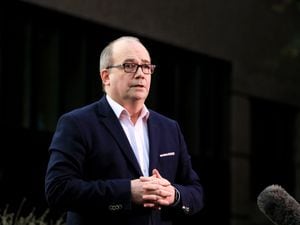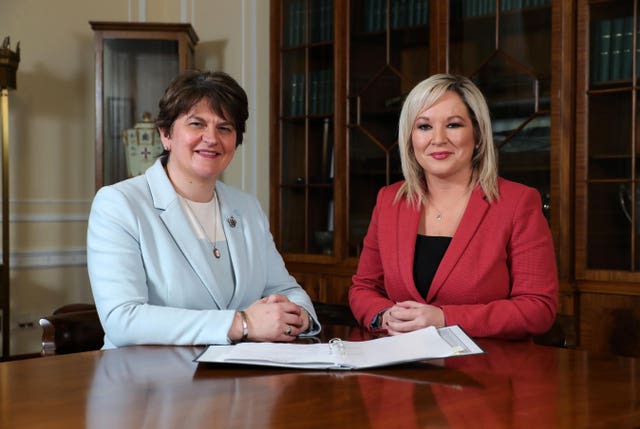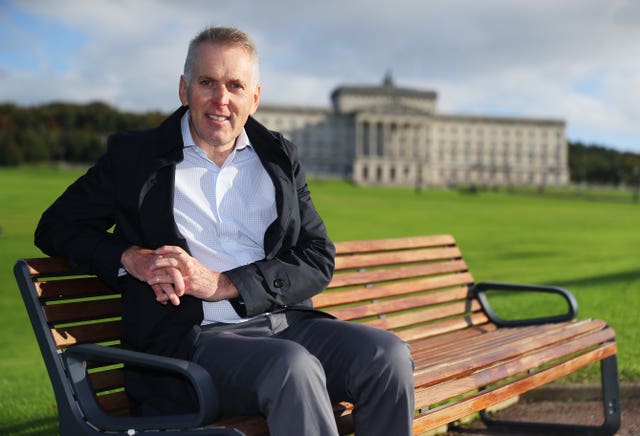Chief medical officer voiced frustrations with Stormont politicians over Covid
It came amid disagreement around containing the coronavirus pandemic in autumn 2020.

Northern Ireland’s chief medical officer, Dr Michael McBride, blasted politicians as “dysfunctional bastards” in 2020 at the height of the coronavirus pandemic.
Fractious exchanges at Stormont were detailed during the Covid-19 Inquiry during its first day of sitting in the region on Tuesday.
During her opening statement to the sitting of the inquiry in Belfast, Clair Dobbin KC, lead counsel to the inquiry, detailed a chronology of the political response to the pandemic.
She described evidence to the inquiry of ministers being in “disarray” as the coronavirus pandemic arrived in the region.

The Stormont Executive was reformed in January 2020 following a three-year political collapse and was contending with Brexit arrangements as well as playing catch-up after the break in devolved government.
At that stage, civil contingency measures had not been reviewed in 20 years.
Ms Dobbin said Northern Ireland had its first confirmed case of Covid-19 by the start of March, and the inquiry understands that the first “substantial” discussion around the virus at the Executive came on March 2.
On March 11, the Republic of Ireland introduced a package of measures, including the closure of schools.
On the following day, then-first minister Dame Arlene Foster and deputy first minister Michelle O’Neill met with the then-head of the civil service David Sterling, who told them there was no medical or scientific advice to support the measures announced by the Taoiseach.
The Executive met on March 16 when there were 45 cases of the virus in the region. Ms Dobbin said notes from that meeting indicate a “change” in attitude, and “obvious anxiety about what was taking place”.
Ms O’Neill is recorded as saying “they lost control two weeks ago”, while the communities minister “referred to people being terrified”, and Justice Minister Naomi Long “referred to the Executive giving mixed messages”.

Ms Dobbin told the inquiry: “there were references to ministers not being shouted down”, and Health Minster Robin Swann was said to have said they had been preparing for the past seven weeks”.
Ms Dobbin said a Whatsapp message from Mr Sterling on March 17 read: “The Executive meeting yesterday was excruciating, no leadership on display at all”.
She said another Whatsapp from Mr Sterling said it should never be underestimated how difficult it is to get the simplest things agreed, and that some seem keener on “scoring points off each other than helping the citizens”.
On March 18, the Executive activated the Northern Ireland hub, described as the operation centre of the contingency arrangements.
The following day, March 19, saw the first death of a person in Northern Ireland with Covid-19.
Ms Dobbin also raised the attendance of Ms O’Neill and then-finance minister Conor Murphy at the funeral of senior republican Bobby Storey despite social distancing rules in force, noting that the incident appeared to prove damaging to relations within the Executive.
By October, Ms Dobbin described the situation in Northern Ireland as having become “really serious” following the relaxing of Covid restrictions in the summer, and said Dr McBride said he had “never been as concerned than he was at that point”, and urging the Executive it had only a short window of opportunity to take action.
It was recommended in October that a six-week “circuit breaker” of restrictions were introduced to stem the number of cases.
Ms Dobbin a series of meetings from November 9, 10, 11 and 12, were “perhaps the most difficult in the Executive committee decision making”.
Then-economy minister Diane Dodds was noted as saying she was distraught with the tone of the meetings and claimed ministers “were not having an honest discussion”, and there were “theatrics” and media leaks to “embarrass” the DUP, before Ms Long suggested the meeting adjourn to avoid risk damaging relations.
Senior official Dr Andrew McCormick described “the most difficult Executive meeting he had ever witnessed”.
There were cross community votes on extending the circuit breakers after the DUP said there were concerns from the unionist community around lockdown measures.
Mr Swann’s special adviser Mark Ovens described the meeting as tense, and said the largest Executive party, then the DUP, was “struggling to grasp the need for action to be taken”.
During the opening statement of Peter Wilcock KC, acting for the Northern Ireland Covid Bereaved Families for Justice, he also touched on “political dysfunction” at Stormont.
He said it was “not a criticism of any individual, political party or community”, but “applied to a number of people who should have known better”.
He revealed that during autumn 2020, Dr McBride “used uncharacteristically coarse language” in an exchange with Mr Swann to express his frustration with local politicians.
“Dysfunctional bastards. How will we ever get through this with an enemy within,” Mr Wilcock read to the inquiry during his opening statement.
“I have a good mind to walk off and leave them to it, as no doubt do you. But then those that really matter, those whom they seem to have forgotten they represent, are really depending on us.”





